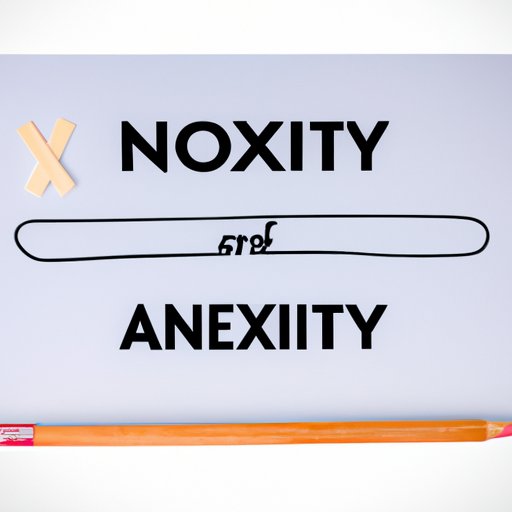
Introduction
Anxiety and weight loss are two aspects of life that can significantly affect an individual’s overall well-being. While they may seem unrelated, anxiety can contribute to unhealthy weight loss, which can lead to serious health consequences if not addressed. In this article, we will explore the relationship between anxiety and weight loss, the effects of anxiety on the body, the behaviors associated with anxiety-induced weight loss, and finally, practical tips for managing anxiety and preventing unintended weight loss.
Overview of Anxiety and Weight Loss
When our body experiences anxiety, it releases stress hormones such as cortisol and adrenaline. These hormones cause physiological responses such as increased heart rate, rapid breathing, and appetite suppression.
The anxiety-induced activation of our fight-or-flight response can lead to unwanted weight loss, as our body enters a state of heightened alertness and energy consumption.
Moreover, anxiety can also affect our metabolic processes and cortisol levels, which have been linked to weight gain and obesity.
Disordered Eating Patterns Associated with Anxiety
Individuals who experience anxiety may develop unhealthy eating patterns due to the stress and emotional distress that typically accompany this condition.
Binge eating is a common disordered eating pattern associated with anxiety. In this case, an individual eats large amounts of food in a short period to escape the unwanted feelings associated with anxiety. In contrast, other individuals may experience restrictive eating behaviors that can lead to malnutrition and weight loss.
It is essential to note that anxiety can also contribute to the development of eating disorders, such as anorexia or bulimia nervosa.
Psychological and Emotional Effects of Anxiety on the Body
Anxiety can affect the body’s stress hormone – cortisol levels in two different ways. First, chronic anxiety can lead to an increase in cortisol levels, which has been linked to weight gain and an increased risk of obesity.
Secondly, if cortisol levels continue to remain high, it can lead to fatigue and compromised immunity, which can negatively affect an individual’s physical health and ability to function optimally emotionally.
It is also important to note that anxiety levels can affect sleep patterns, which can lead to slow metabolism and further calorie burn.
Managing Anxiety and Preventing Weight Loss
It is critical to manage anxiety properly to prevent unintended weight loss and promote emotional well-being. Some tips for preventing weight loss, caused by anxiety, include:
- Seeking therapy or counseling to learn how to manage anxiety
- Practicing mindfulness techniques like deep breathing, meditation and yoga to promote relaxation and calmness
- Engaging in activities that help to manage cortisol levels like exercise and relaxation techniques
- Adopting a balanced approach to physical activity and nutrition
These suggestions might not only help in reducing the physical symptoms of anxiety but also the psychological and emotional effects that come with it.
Stories of Real People
It can be comforting to hear from real people about their experiences with anxiety and weight loss. By sharing their stories, others dealing with similar situations can gain valuable insight and strategies for coping effectively.
Some individuals who have dealt with anxiety-induced weight loss found relief by seeking medical professionals’ help and by using stress management techniques. Others found better life experiences via a well-rounded approach to wellness that encourages regular, mindful exercise and a balanced diet.
Reversing Unintended Weight Loss
If an individual has already lost weight unintentionally due to anxiety-induced weight loss, it is possible to regain weight healthily. It is recommended that individuals seek professional help from a nutritionist or medical doctor to develop individualized eating and exercise plans.
An individual may require adrenal support supplements and other medications to regulate cortisol levels and overall physical well-being. It is essential to stay motivated and focused on long-term goals while taking small but meaningful steps toward a healthy weight.
Seeking Professional Help
It is critical to seek help promptly if an individual suspects that they have anxiety-caused weight loss. Consulting with a medical doctor or nutritionist who understands the complex interplay between anxiety, nutrition, hormones, and physical health can be an excellent step toward regaining quality of life.
Conclusion
By understanding the connection between anxiety and weight loss, individuals can take deliberate steps toward managing anxiety and preventing weight loss. Embracing a well-rounded approach towards physical and emotional wellness can help individuals live a quality life that encourages healthy weight maintenance.
Remember, managing anxiety is a journey and can be challenging, but with the right support, resources, focus, and healthy lifestyle choices, it can be accomplished.




